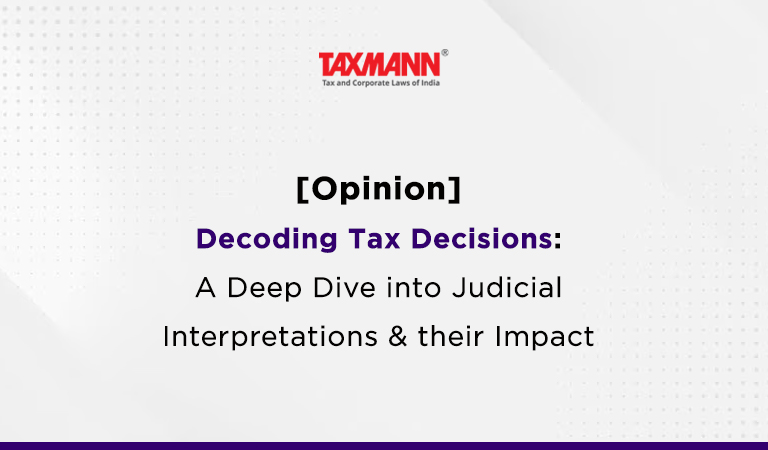[Opinion] Decoding Tax Decisions: A Deep Dive into Judicial Interpretations & their Impact
- Blog|News|Income Tax|
- 3 Min Read
- By Taxmann
- |
- Last Updated on 24 April, 2023

S. Krishnan – [2023] 149 taxmann.com 354 (Article)
1. Introductory Remarks
If certain tax decisions rendered by judicial authorities especially the ones rendered by High Courts and the Supreme Court are studied in detail, then proper understanding of such decisions emerge. It may, at first, reading appear to be totally decided against the assessee but on effective and depth reading by a tax consultant, he will understand the points on which a particular decision has been rendered against the assessee and which points have not been considered or touched upon by such judicial authority. This inkling happened recently to the author of this article when he went through the decision of the Supreme Court in the case of CIT v. Paville Projects (P.) Ltd. [2023] 149 taxmann.com 115 and the first impression that entered his mind was the Supreme Court has given a new dimension to the concept of “expenditure forming part of the cost” but on depth reading it became clear that what was decided by the Supreme Court was giving an additional opportunity to the Assessing Officer by affirming the 263 order passed by the Commissioner of Income-tax. Both the Tribunal and the High Court held in favour of the assessee by striking down the 263 order passed by the Commissioner of Income-tax.
So let us start this discussion by analysing the decision of the Supreme Court in the case of Paville Projects (P.) Ltd. (supra). The discussion then shifts to 2 decisions rendered by 2 High Courts which have explained lucidly how earlier decisions rendered by judicial authorities have to be studied in detail and understood. Reference to 2 Supreme Court decisions touching on the same subject have been made and then explained. Certain uncertainty existing on interpretation of earlier decision by the later decision has also been taken note of. The article concludes with the views of the author on the decision rendered by the Supreme Court in the case of Paville Projects (P.) Ltd (supra).
2. Analysis of the decision of the Supreme Court in the case of Paville Projects (P.) Ltd
2.1 Decision of the Supreme Court
The Supreme Court in the case of Paville Projects (P.) Ltd. (supra) held as under-
“Where company’s property was sold for Rs. 33 crores and it was sold to give effect to arbitral award settling disputes among company’s shareholders being members which required company to pay Rs. 31.05 crores to the shareholders, the Assessing Officer’s assessment order was clearly erroneous and prejudicial to the interest of the Revenue within the meaning of section 263 of the Act as the order erroneously accepted the claim of assessee-company and allowed deduction of Rs. 31.05 crores in computing capital gains in contravention of section 55(1)(b) of the Act and the Commissioner of Income-tax rightly invoked the jurisdiction vested in him under section 263.
Under the Circumstances and in the facts and circumstances of the case the High Court had committed a very serious error in setting aside the order passed by the Commissioner of Income-tax passed in exercise of powers under section 263 of the Act. In view of the above and for the reasons stated above, present appeal succeeds. The impugned judgment and order passed by the High Court is hereby quashed and set aside and that the order passed by the Commissioner passed in exercise of powers under section 263 of the Income-tax Act is hereby restored.”
Click Here To Read The Full Article
Disclaimer: The content/information published on the website is only for general information of the user and shall not be construed as legal advice. While the Taxmann has exercised reasonable efforts to ensure the veracity of information/content published, Taxmann shall be under no liability in any manner whatsoever for incorrect information, if any.

Taxmann Publications has a dedicated in-house Research & Editorial Team. This team consists of a team of Chartered Accountants, Company Secretaries, and Lawyers. This team works under the guidance and supervision of editor-in-chief Mr Rakesh Bhargava.
The Research and Editorial Team is responsible for developing reliable and accurate content for the readers. The team follows the six-sigma approach to achieve the benchmark of zero error in its publications and research platforms. The team ensures that the following publication guidelines are thoroughly followed while developing the content:
- The statutory material is obtained only from the authorized and reliable sources
- All the latest developments in the judicial and legislative fields are covered
- Prepare the analytical write-ups on current, controversial, and important issues to help the readers to understand the concept and its implications
- Every content published by Taxmann is complete, accurate and lucid
- All evidence-based statements are supported with proper reference to Section, Circular No., Notification No. or citations
- The golden rules of grammar, style and consistency are thoroughly followed
- Font and size that’s easy to read and remain consistent across all imprint and digital publications are applied



 CA | CS | CMA
CA | CS | CMA
